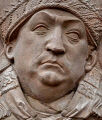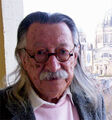Template:Selected anniversaries/March 5: Difference between revisions
No edit summary |
No edit summary |
||
| Line 4: | Line 4: | ||
File:William Oughtred.jpg|link=William Oughtred (nonfiction)|1574: Mathematician [[William Oughtred (nonfiction)|William Oughtred]] born. He will invent the slide rule in 1622. | File:William Oughtred.jpg|link=William Oughtred (nonfiction)|1574: Mathematician [[William Oughtred (nonfiction)|William Oughtred]] born. He will invent the slide rule in 1622. | ||
File:Didacus automaton profile.jpg|link=Didacus automaton (nonfiction)|1640: [[Didacus automaton (nonfiction)|Didacus automaton]] attends and records lecture by [[William Oughtred (nonfiction)|William Oughtred]], which it will later use to detect and prevent [[crimes against mathematical constants]]. | File:Didacus automaton profile.jpg|link=Didacus automaton (nonfiction)|1640: [[Didacus automaton (nonfiction)|Didacus automaton]] attends and records lecture by [[William Oughtred (nonfiction)|William Oughtred]], which it will later use to detect and prevent [[crimes against mathematical constants]]. | ||
||Charles Eryl Wynn-Williams (5 March 1903 – 30 August 1979), was a Welsh physicist,[1] noted for his research on electronic instrumentation for use in nuclear physics. His work on the scale-of-two counter contributed to the development of the modern computer. | |||
File:Lev Schnirelmann.jpg|link=Lev Schnirelmann (nonfiction)|1926: Mathematician [[Lev Schnirelmann (nonfiction)|Lev Schnirelmann]] reverse-engineers [[Didacus automaton (nonfiction)|Didacus automaton]], retrieves complete copy of lecture by [[William Oughtred (nonfiction)|William Oughtred]]. | File:Lev Schnirelmann.jpg|link=Lev Schnirelmann (nonfiction)|1926: Mathematician [[Lev Schnirelmann (nonfiction)|Lev Schnirelmann]] reverse-engineers [[Didacus automaton (nonfiction)|Didacus automaton]], retrieves complete copy of lecture by [[William Oughtred (nonfiction)|William Oughtred]]. | ||
File:Joseph Weizenbaum.jpg|link=Joseph Weizenbaum (nonfiction)|2008: Computer scientist [[Joseph Weizenbaum (nonfiction)|Joseph Weizenbaum]] dies. He is considered one of the fathers of modern artificial intelligence. | File:Joseph Weizenbaum.jpg|link=Joseph Weizenbaum (nonfiction)|2008: Computer scientist [[Joseph Weizenbaum (nonfiction)|Joseph Weizenbaum]] dies. He is considered one of the fathers of modern artificial intelligence. | ||
Revision as of 17:43, 23 July 2017
1223 BC: Solar eclipse occurs; the event is recorded in a Syrian clay tablet, in the Ugaritic language.
1499: Polymath Johannes Trithemius uses Gnomon algorithm functions to generate new class of cryptographic numen.
1574: Mathematician William Oughtred born. He will invent the slide rule in 1622.
1640: Didacus automaton attends and records lecture by William Oughtred, which it will later use to detect and prevent crimes against mathematical constants.
1926: Mathematician Lev Schnirelmann reverse-engineers Didacus automaton, retrieves complete copy of lecture by William Oughtred.
2008: Computer scientist Joseph Weizenbaum dies. He is considered one of the fathers of modern artificial intelligence.
2009: Scientist and combat surgeon Asclepius Myrmidon demonstrates new techniques in combat medicine using Gnomon algorithm techniques.
2016: Computer programmer and engineer Ray Tomlinson dies. He implemented the first email system on ARPANET, including the "@" separator which is still in use today.







